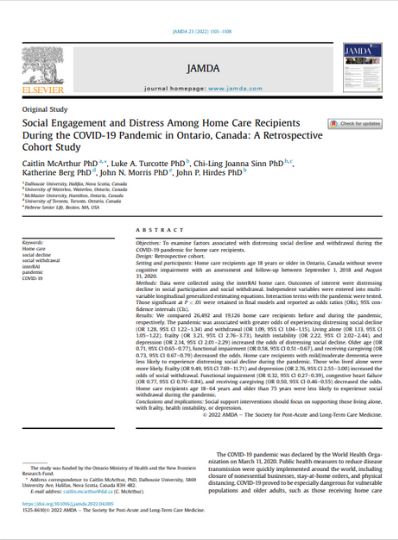Social Engagement and Distress Among Home Care Recipients During the COVID-19 Pandemic in Ontario, Canada: A Retrospective Cohort Study
Examine factors associated with distressing social decline and withdrawal during the COVID-19 pandemic for home care recipients using a retrospective cohort study.
Author: Caitlin McArthur, Luke A. Turcotte, Chi-Ling Joanna Sinn, Katherine Berg, John N. Morris, John P. Hirdes
Publication Date: April 17, 2022
Description:
Objectives: To examine factors associated with distressing social decline and withdrawal during the COVID-19 pandemic for home care recipients.
Design: Retrospective cohort. Setting and participants: Home care recipients age 18 years or older in Ontario, Canada without severe cognitive impairment with an assessment and follow-up between September 1, 2018 and August 31, 2020.
Methods: Data were collected using the interRAI home care. Outcomes of interest were distressing decline in social participation and social withdrawal. Independent variables were entered into multivariable longitudinal generalized estimating equations. Interaction terms with the pandemic were tested. Those significant at P < .01 were retained in final models and reported as odds ratios (ORs), 95% confidence intervals (CIs).
Results: We compared 26,492 and 19,126 home care recipients before and during the pandemic, respectively. The pandemic was associated with greater odds of experiencing distressing social decline (OR 1.28, 95% CI 1.22‒1.34) and withdrawal (OR 1.09, 95% CI 1.04‒1.15). Living alone (OR 1.13, 95% CI 1.05‒1.22), frailty (OR 3.21, 95% CI 2.76‒3.73), health instability (OR 2.22, 95% CI 2.02‒2.44), and depression (OR 2.14, 95% CI 2.01‒2.29) increased the odds of distressing social decline. Older age (OR 0.71, 95% CI 0.65‒0.77), functional impairment (OR 0.58, 95% CI 0.51‒0.67), and receiving caregiving (OR 0.73, 95% CI 0.67‒0.79) decreased the odds. Home care recipients with mild/moderate dementia were less likely to experience distressing social decline during the pandemic. Those who lived alone were more likely. Frailty (OR 9.49, 95% CI 7.69‒11.71) and depression (OR 2.76, 95% CI 2.55‒3.00) increased the odds of social withdrawal. Functional impairment (OR 0.32, 95% CI 0.27‒0.39), congestive heart failure (OR 0.77, 95% CI 0.70‒0.84), and receiving caregiving (OR 0.50, 95% CI 0.46‒0.55) decreased the odds. Home care recipients age 18‒64 years and older than 75 years were less likely to experience social withdrawal during the pandemic.
Conclusions and implications: Social support interventions should focus on supporting those living alone, with frailty, health instability, or depression.
Access: Free
Keywords: Home care, social decline, social withdrawal, interRAI, pandemic, COVID-19



